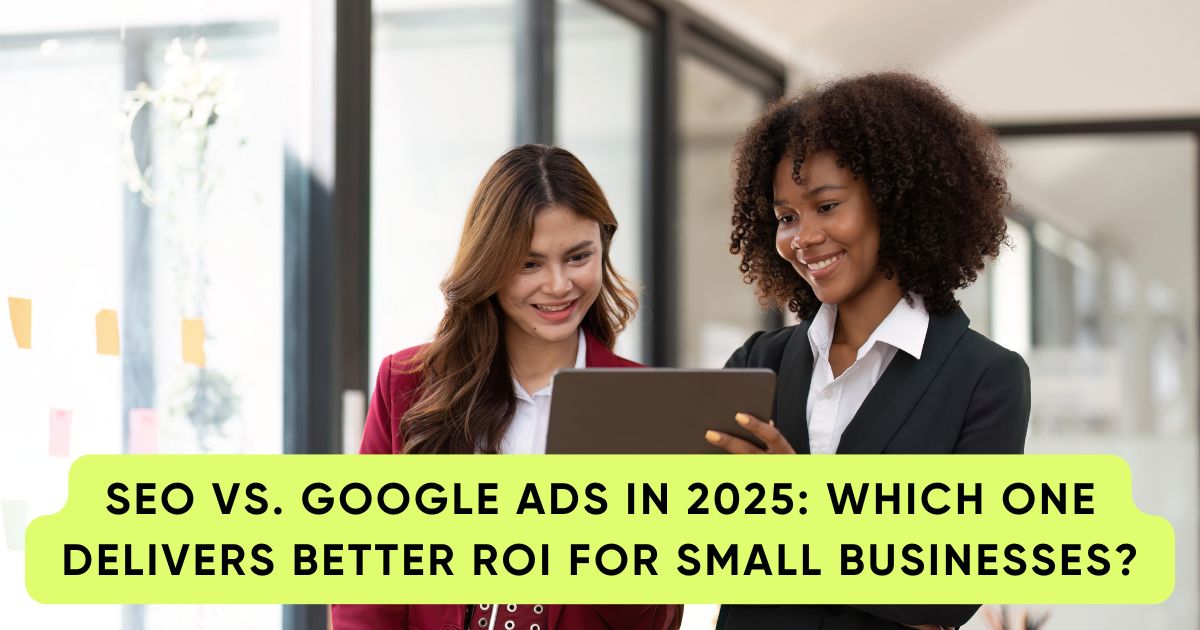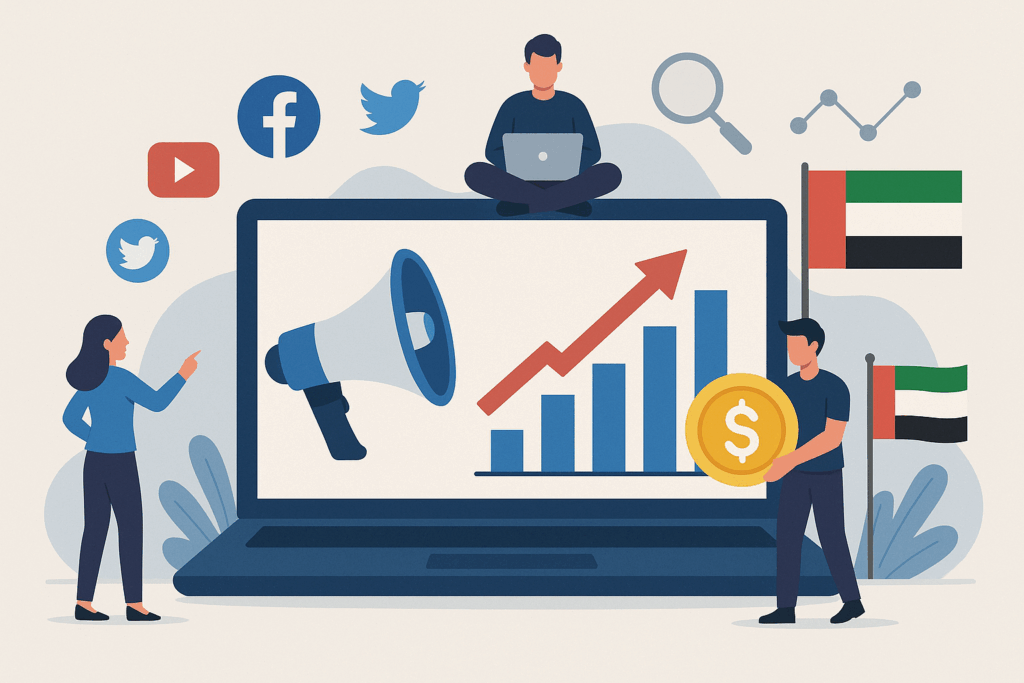In today’s hyper-competitive digital world, small businesses are faced with a common question: Should we invest in SEO or Google Ads? The answer isn’t always clear, especially when marketing budgets are tight and every rupee spent must yield measurable results. Both channels have their strengths, but the right choice depends on your business goals, timeline, and growth strategy.
In 2025, with shifting consumer behaviors and algorithmic advancements, understanding the ROI from digital marketing agency efforts is more critical than ever. This article breaks down the long-term and short-term value of both SEO services and paid search (PPC), helping you decide the smarter investment path.
Understanding Basics: SEO and Google Ads
Before we dive into ROI comparisons, let’s quickly clarify what each strategy entails.
Search Engine Optimization (SEO) is the process of improving your website’s visibility organically in search engine results. It includes on-page, off-page, and technical optimization, and often involves working with an SEO freelancer, SEO analyst, or SEO consultant.
On the other hand, Google Ads (PPC) allows you to pay for ad placements on search engine result pages. It’s an effective strategy for quick visibility and instant traffic, but it comes at a recurring cost.
Both approaches are widely used by an expert SEO agency and E-commerce marketing consultant to help businesses boost online presence and conversions.
Short-Term Impact: Speed vs Sustainability
Small businesses often look for fast results. In that scenario, Google Ads have the upper hand. You can launch a campaign today and start getting traffic within hours. This is extremely beneficial for new product launches, promotions, or seasonal sales.
However, once you stop paying, the traffic disappears. That’s the downside.
With website and SEO services, results take time. It could be weeks or months before you see a noticeable rise in rankings and organic visits. But once established, SEO brings consistent, cost-effective traffic without ongoing ad spend.
ROI Analysis: What Matters Most for Small Businesses
Now, let’s compare return on investment.
When measuring ROI, most small business owners factor in cost per acquisition (CPA), long-term value (LTV), and overall campaign efficiency.
SEO services for small businesses generally have a higher initial cost and longer timeline. But the long-term ROI tends to be greater because organic traffic is free after initial optimization. For example, ranking on the first page for a keyword relevant to your business can bring in hundreds of leads monthly—without paying per click.
Google Ads might show a faster CPA, but it’s expensive in competitive niches. An E commerce SEO expert may point out that while PPC might cost ₹50–₹200 per click in certain industries, SEO provides a scalable and sustainable return over time.
Budget Considerations for 2025
With rising ad costs in 2025 and increasing competition in paid media, small businesses must be careful. SEO has become even more essential as businesses look for cost-effective channels.
If you’re a startup or launching a new website, combining both strategies is smart: Use online digital marketing services to drive immediate traffic via PPC while building SEO for long-term growth.
Agencies offering custom web development solutions often pair website builds with a strong SEO foundation to avoid missed opportunities.
Targeting Right Audience
SEO allows you to attract users who are actively searching for your services. These users have high intent and are more likely to convert. A small business selling fashion items or electronics can benefit greatly from E commerce website design combined with SEO to capture search-driven sales.
Google Ads, while fast, might result in lower-quality traffic if the campaigns aren’t properly optimized. You’ll need advanced web analytics services and conversion tracking to ensure you’re not wasting ad spend.
Integration with Other Marketing Channels
Successful digital strategies don’t rely solely on SEO or Ads—they integrate multiple channels. For instance, an E-commerce marketing specialist may use:
- Email marketing automation to nurture leads from organic search.
- Copywriting services to improve ad click-through and landing page conversion.
- A strategic social media strategy to retarget users who visited via SEO or PPC.
This holistic approach boosts ROI across the funnel and makes your investment in either SEO or PPC more efficient.
Industry-Specific Insights
Certain industries benefit more from SEO—especially those with high search volume and evergreen content potential. A bakery, salon, or local law firm, for example, may get better ROI from localized SEO services.
However, time-sensitive businesses or seasonal campaigns (e.g., online courses or holiday sales) may require Google Ads for immediate traction.
Keeping up with latest technology tips and trends helps in tailoring the strategy per niche. Digital marketing professionals often leverage the best SEO tools to analyze keywords, track competition, and audit performance.
Choosing Right Partner
If you’re unsure which path to take, consult a professional. Hiring a reliable SEO freelancer or working with an expert SEO agency can help you assess your goals, industry benchmarks, and marketing funnel.
Meanwhile, a digital-first E-commerce marketing consultant can guide you in allocating budget between channels and aligning efforts with business KPIs.
When choosing a provider, ask about past client success, use of web analytics services, and how they integrate SEO with custom web development solutions.
SEO vs Google Ads: Summary Table
| Feature | SEO | Google Ads |
| Cost | Higher upfront, lower long-term | Pay-per-click, ongoing |
| Speed of Results | Slow but steady | Instant visibility |
| Sustainability | Long-term | Short-term |
| Best For | Evergreen content, local visibility | Promotions, launches |
| ROI Timeline | Medium to long | Short-term only |
| Click Trust | Higher (organic) | Lower (ad fatigue) |
| Skill Requirement | Long-term strategy planning | Technical bidding & creative |
FAQs
Q1. Is SEO better than Google Ads for long-term business growth?
Yes, for most small businesses, SEO delivers higher ROI in the long run by generating consistent, organic traffic that doesn’t require continuous ad spend.
Q2. Can I use both SEO and Google Ads together?
Absolutely. Many businesses start with PPC for immediate traffic while building SEO for sustainable growth. A balanced strategy often delivers the best results.
Q3. How do I know if my SEO is working?
You can track progress through web analytics services like Google Analytics and Search Console. Look for increased organic traffic, better keyword rankings, and improved engagement metrics.
Q4. Is it cheaper to hire an SEO freelancer than an agency?
Yes, hiring an SEO freelancer is often more cost-effective for small businesses, though agencies may offer broader services like email marketing automation, copywriting services, and full social media strategy execution.
Q5. What skills should I look for in an SEO consultant?
Look for expertise in keyword research, content strategy, technical SEO, and analytics. Also, make sure they’re familiar with the best SEO tools and updated on latest technology tips in digital marketing.
So, what’s your experience—have you seen better results from SEO or Google Ads in your business? Share your thoughts below and join the discussion!









